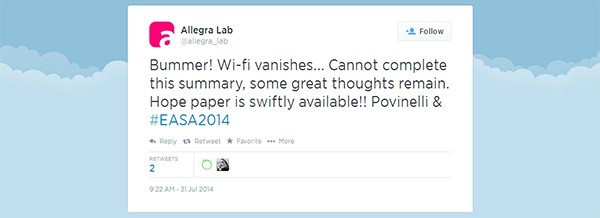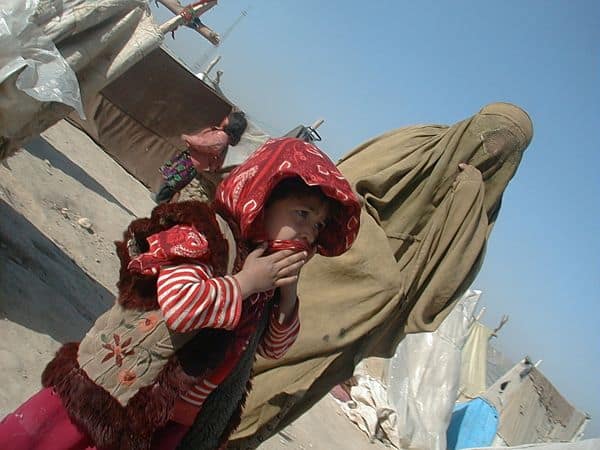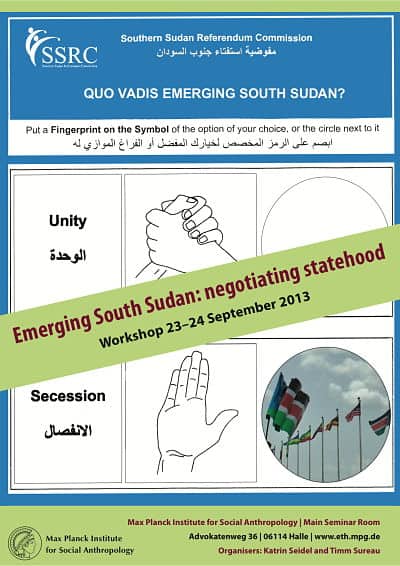So the first day of the #EASA2014 is behind us. What did it leave us with; what was HOT and what was NOT?!
Clearly it is TOO SOON for conclusions of any sort; after all, the event has barely began. Yet there are things to report too, not least because of the reactions awakened by the keynote delivered yesterday by Elizabeth Povinelli, Franz Boas Professor of Anthropology at Columbia University. In her speech Povinelli spoke of her continuing project among Australian aborigines, highlighting particularly the accompanying film projects, one of which led her also to the Berlin Biennale in 2012.
Allegra already filled you in with some glimpses of the talk yesterday via Twitter – no easy task given that the talk was held in one of the few Conference venues without high speed internet connection. Consequently we had to also sign out prematurely, and left our observant followers merely with a wish for ‘the speedy arrival of this paper with undoubtedly many more great insights to come’.
Overall this statement communicates that members of the Allegra team found numerous elements of the paper that they enjoyed – the talk of new social media as offering possibilities to overcome theoretical and methodological deadlocks; the idea of aspiring for new forms of collaboration, phrased by Povinelli as ‘alterations’.
But what of the views of the talk in general? Since one of the purposes of all academic work, in our eyes, should be to awaken thoughts, in this register the talk more than delivered. For right after it ended, outside the beautiful Concert Hall that functioned as the site of the talk, emotions were running high.
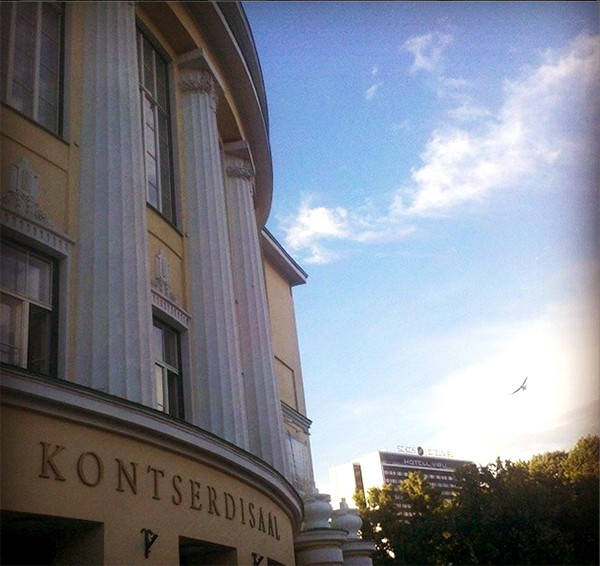 Now, as we all know, the very purpose of Allegra’s existence is to find creative ways to fill ‘DEAD SPACE’ that customarily would appear in between these heated discussions and the polished – watered down too? – views to be delivered via ‘traditional’ academic channels. Thus we want to share some of these views while they are still ‘raw’ and unprocessed.
Now, as we all know, the very purpose of Allegra’s existence is to find creative ways to fill ‘DEAD SPACE’ that customarily would appear in between these heated discussions and the polished – watered down too? – views to be delivered via ‘traditional’ academic channels. Thus we want to share some of these views while they are still ‘raw’ and unprocessed.
So it is in this spirit that we are taking a chance here, putting ourselves – and our reputation – on the line and sharing some spontaneous reactions on the talk. Risky – definitely! Wise – the jury can remain out on that! Crucial for the collective vitality of our discipline & professional space? ABSOLUTELY!
To put it moderately, it seems undisputed to say that Povinelli’s talk awakened some intense reactions. Some strong views poured in her support, but we would not be truthful to our observations if we did not say that critical views seemed more vocal. The gist of criticism? For many central appeared to grow a certain lack of reflection.
As if: “She was pretending to reflect on the interaction between herself and the people, quoting Deleuze so one cannot say that it was not reflective. But the aim just fell short. She spoke of using new media and digital technologies, but without analyses of how they would interact with prevailing power relations. Thus her talk of collaboration as alteration remained underdeveloped.”

Ouch – we have a tough crowd here, people!
Many more comments poured in, but given the non-existent time for reflection and elaboration, we won’t continue further. Rather, let’s think momentarily if Povinelli’s talk has a context that should be considered here. For there were also those who took notice of the fact that – once again – it was an American scholar who had been summoned to open a conference of European anthropologists.
 Sure, this trans-Atlantic exchange may be something of an unofficial tradition – the AAA in Chicago last year was, after all, opened by Bruno Latour and Philippe Descola, two prominent French anthropologists. So Povinelli’s invitation could also be seen as an amicable gesture in such collegiality.
Sure, this trans-Atlantic exchange may be something of an unofficial tradition – the AAA in Chicago last year was, after all, opened by Bruno Latour and Philippe Descola, two prominent French anthropologists. So Povinelli’s invitation could also be seen as an amicable gesture in such collegiality.
But reading these comments – not entirely insignificant in number or intensity – from a European perspective, perhaps there is also something more: a growing shared frustration over how the American scholarly scene is dominating the debate also within anthropology. And perhaps from this angle the mood was, sort of, somewhat unfavourably disposed toward Povinelli to begin with.
And since it remains FAR too soon, once again, for genuinely sophisticated reflections, we want to end our comments here – while attempting to find also some comic relief to soften the bite of these sharp criticisms. Perhaps things were a bit jinxed for Povinelli from the start. How else to account for the disappearance of wi-fi in the keynote venue in a country where – as the President of the EASA Noel Salazar said just moments before she began her talk – where “Internet access is considered a human right”?
And then the failing of her Power point at a Conference where we know there to be a whole army of people attending to all technical matters! Not to mention the disappearance of the voice track from the video clip that she wanted to share to culminate her talk.

We don’t know nothing for sure, but we just wanna say: in the beautiful Allegra flat in the heart of Old Tallinn, built some circa 650 years ago there is reportedly only one ghost – and that ghost makes very seldom appearances. Perhaps all this Allegra commotion in the flat awakened the ghost from a millennia long sleep, provoking her to take her irritation out on Povinelli… We don’t know for sure, but everything is possible…
Stay tuned for more views – and share your thoughts with us! You know how to reach us – Allegra is increasingly EVERYWHERE! And stay tuned for MUCH MORE as the #EASA2014 continues to unfold through the participation of 1200 anthropologists!
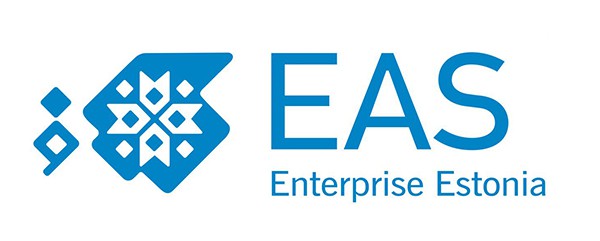 Enterprise Estonia is Allegra’s official sponsor for #EASA2014.
Enterprise Estonia is Allegra’s official sponsor for #EASA2014.


